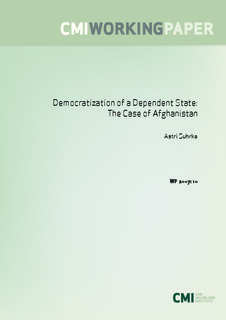| dc.description.abstract | The post-Taliban democratic reforms in Afghanistan were in part a recreation of the past. Afghanistan has had six constitutions between 1923 and 1990, and most provided for national assemblies and elections in one form or other. Yet the degree of foreign involvement in the last reform process was unprecedented.
The heavy foreign hand contradicted the promise of national autonomy, representation and fair process held out by the democratization agenda. By implicitly devaluing the institutions it sought to promote, the democratization process has also had potentially counterproductive effects. Moreover, while promoting democratization, Western governments simultaneously created a state so dependent on external support that it deprived the critical institution of liberal democracy – the legislature – of its meaning. The logical response of the national assembly has been to mostly engage in politics with symbolic or nuisance value. The article focuses on three areas of political reform: the structuring of the interim administration, the promulgation of a new constitution, and the establishment of the legislature. | |
